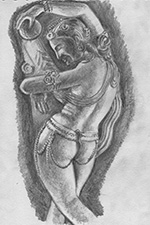Pennine Poets
Nicholas Bielby

He is married, with two adult children and three granddaughters. His interests include oil painting, ballet and sailing, and he has recently, at 75, taken up rowing. He is a City and Guilds qualified Craftsman Welder.
Selected Poems
Nietzsche in Turin
The final tipping point for Nietzsche was
seeing a coachman, on a Turin street,
flogging his fallen horse. Defending it,
he flung his arms around its neck, because -
ah, what 'because'? He'd just written, ardently,
"What is more harmful than any vice is?
Active pity for all failures, losers
and all the weak: Christianity."
Pity and terror, expunge them - Plato's call.
God's "horrible secret": "All that is nailed
to the cross is divine." He hated the failed:
their elevation, the natural order's fall.
Then, going mad ten years before he died,
Nietzsche signed himself "The Crucified".
from The Camden Town Group
1. Jacques-Emil Blancheo describes his friend, Walter Sickert
I'd have to say he has a heart of stone,
but is as fascinating as he finds
himself. Like every great man, saint or man
of genius, he sacrifices friends,
lovers, family and, mostly, wives
to his vocation. He's a selfish brute,
it's true, yet he enriches all our lives
by who he is, his friendship and his art.
He needs us since he needs an audience
and does not know, or else he does not rate,
the damage that he does. He has no sense
others might live for other things than art.
We, who've learnt to love him at arm's length,
relish the man, are nourished by his strength.
4. Lucien Pissarro, who represented Camille Pissarro's ideas to the Group
I am a man of small ambitions - which suits
my talents well. With no side quite my own,
I am content with what I've always known -
poor dear old father's gift palely dilutes
in me, my personality, and in
my paintings, too. His brilliance was too strong
for me in France, so I came here, for long
evenings, a lesser light. And for my kin,
my Esther, whom I first met as a child
and who has been my confidante and love
in all the struggles I have had to prove
worthy of the ideals father instilled.
I like to find a place, between trees,
to work where I'm not too conspicuous.
6. Harold Gilman, talks about his neighbour, Walter Sickert
Sickert? I've not seen much of him of late.
Though I admire him, I must do otherwise.
Not for me, his muddy colours! Yet his
dark tones are richer than en plein air light.
I like to use those darker tones but work
in purer colour - not raw, straight from the tube,
but deep and clear, so juxtaposed they throb,
like light reflected in a shaded brook.
Sickert paints with spontaneity -
he loads his brush, one touch and happy chance
discharges it like electricity -
while every mark I make is measured, thought
carefully about. My colours dance
within a geometry that I have wrought.

In the Laksmana Temple, Khajuraho
Salabanjika stands in high relief
in the deep gloom, high on a ledge within
the temple. The shallow valley of her spine
sinuously twists as if
her slow exuberance expressed itself
like climbing vines around a tree or like
those roots of jungle trees that coil and snake
round ancient stonework. On her shelf,
her head half-turned in profile, eyes downcast,
her breast so swells beneath her half-raised arm
you'd think the stone itself was soft and warm.
With two plump creases at her waist,
she looks serene. With her clear brow, straight nose
and an archaic smile upon her lips,
she has her inwardness; and yet her hips
are smooth and rounded, sensuous
in the reflected glare that models them,
highlights the loops of beads that guide the eyes
around the contours of her buttocks, thighs,
the fullness of her perfect form -
the ideal form of what desire seeks,
a something unattainable beyond
fulfilment; something for the sensual mind
to contemplate: its paradox.
Salabanjika stands in high relief
in the deep gloom, high on a ledge within
the temple. The shallow valley of her spine
sinuously twists as if
her slow exuberance expressed itself
like climbing vines around a tree or like
those roots of jungle trees that coil and snake
round ancient stonework. On her shelf,
her head half-turned in profile, eyes downcast,
her breast so swells beneath her half-raised arm
you'd think the stone itself was soft and warm.
With two plump creases at her waist,
she looks serene. With her clear brow, straight nose
and an archaic smile upon her lips,
she has her inwardness; and yet her hips
are smooth and rounded, sensuous
in the reflected glare that models them,
highlights the loops of beads that guide the eyes
around the contours of her buttocks, thighs,
the fullness of her perfect form -
the ideal form of what desire seeks,
a something unattainable beyond
fulfilment; something for the sensual mind
to contemplate: its paradox.
« Back
 |
 |
| © pennine poets 2016 | |